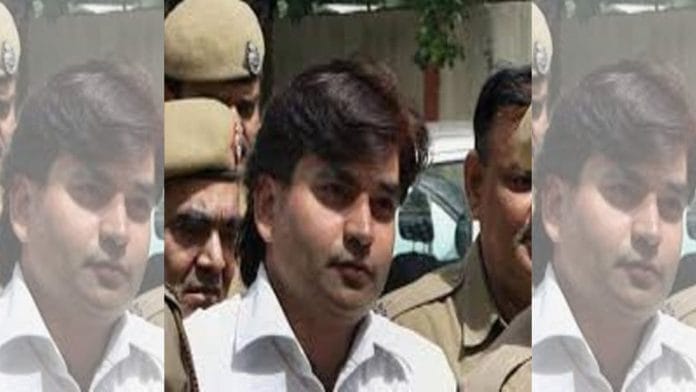New Delhi: Three instances of punishment due to violation of prison rules, including aggression towards other inmates, is why the Delhi Prisons administration rejected the furlough of Vikas Yadav, convicted in the 2002 murder of business executive Nitish Katara.
The order, issued by the Deputy Superintendent-Legal, Prisons Headquarters (PHQ), Delhi Prisons, on 23 October said that Yadav’s conduct was found to be “unsatisfactory”, according to sources.
Yadav is the son of Uttar Pradesh politician Dharam Pal Yadav. In 2016, the Supreme Court awarded him a 25-year jail term, while upholding a Delhi High Court order, for kidnapping and killing Katara.
According to sources, Yadav’s furlough was rejected because of his “aggressive behaviour” in the past. He was awarded punishments for violation of jail rules on three instances in the past—28 May 2012, 10 July 2013, and 10 October 2017.
Prison punishments can range from being barred from making phone calls to not being allowed to go to the canteen for a couple of days depending on the gravity of the violation, according to the prison rules.
The court’s order that he should undergo 25 years of actual imprisonment without the consideration of remission also came into play.
“Two factors had come into play in this. One is the behaviour of the inmate and the other is technical—the sentence that the inmate is serving,” a source explained.
Furlough is given to inmates serving long-term sentences and the period for which the furlough is granted is treated as remission of their sentence.
“In furlough, the number of days granted don’t get added to the sentence they are serving. In parole, the number of days or the period of time an inmate is granted parole gets added to their sentence,” the source explained.
Yadav’s plea for furlough was also rejected in 2018 when he approached the Delhi High Court. “The competent authority on subjective satisfaction having found the conduct of the petitioner while undergoing the conviction to be not good, and after proper interpretation of the guidelines having rejected the same, and the learned writ Court also on reconsideration has approved this rejection, we see no error or illegality in the same warranting reconsideration by us now in this appeal (sic),” the Delhi High Court, at the time, noted.
There are several criteria that a prisoner must fulfil to be eligible for furlough, according to Rule 1223 of Delhi Prison Rules 2018. Prisoners should have good conduct in prison, earn rewards in the last three annual good conduct reports, be citizens of India, and not be habitual offenders, it says.
Earlier, Yadav had also applied for parole which was rejected both by the Supreme Court as well as the Delhi High Court.
Yadav’s cousin, Vishal, was also awarded 25 years imprisonment, while another accused Sunil Pehelwan was awarded a 20-year jail term. The three were convicted of kidnapping and killing Katara on the intervening night of 16-17 February 2002 in Ghaziabad. Yadav allegedly disapproved of Katara’s relationship with his sister Bharti.
Prior to that, Yadav was sentenced to four years in jail for his involvement in the 1999 murder of model Jessica Lal by the Delhi High Court. In August 2017, while rejecting his review plea against the 25-year jail term awarded to him in the Katara murder case, the Supreme Court noted that Yadav had murdered Katara while out on bail in the Jessica Lal murder case.
(Edited by Sanya Mathur)







A family of hooligans, thugs and murderers. The Yadav family, led by the criminal patriarch Dharam Pal Yadav, is a reminder of what Uttar Pradesh used to be under the Samajwadi Party reign – an utterly lawless land where anybody with political clout could get away with murders and rapes.
It’s disappointing to see that a large number of people still vote for Samajwadi Party nowadays. Maybe these were the people who benefited from the crimes and lawlessness of the SP era.